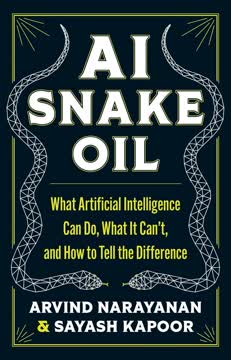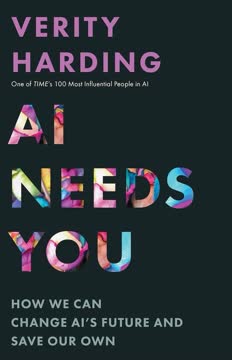Key Takeaways
1. AI's development reflects our values and choices
Technology is built by human beings, who bring to it their light and their shadow.
AI mirrors humanity. The development of AI is not a neutral process but one deeply influenced by the values, biases, and cultural context of its creators. This means that AI systems can reflect both the best and worst aspects of human nature.
Ethical considerations are crucial. As AI becomes more integrated into our daily lives, it's essential to consider the ethical implications of its development and deployment. This includes addressing issues of bias, privacy, and the potential for misuse.
Key areas of concern:
- Facial recognition technology
- Automated decision-making systems
- AI-powered surveillance
- Job displacement due to automation
2. Political leadership shapes technology's societal impact
Kennedy understood that a true leader will use that advantage to try and generate gains for everyone else, too.
Government's role is vital. Political leaders play a crucial role in shaping how technology impacts society. Their decisions can determine whether technological advancements benefit all of society or exacerbate existing inequalities.
Historical examples provide guidance. The Space Race and the development of the internet demonstrate how political leadership can guide technological advancements towards peaceful and beneficial outcomes, even in times of geopolitical tension.
Lessons from history:
- The Outer Space Treaty of 1967
- Al Gore's vision for the National Research and Education Network
- The creation of ICANN (Internet Corporation for Assigned Names and Numbers)
3. Inclusive governance is crucial for ethical AI development
We can build and use technology that is peaceful in its intent, serves the public good, embraces its limitations rather than fighting them, and is rooted in societal trust.
Multistakeholder approach. Effective AI governance requires input from diverse stakeholders, including technologists, policymakers, ethicists, and representatives from various communities affected by AI.
Balancing interests. Inclusive governance helps balance the interests of different groups and ensures that AI development considers a wide range of perspectives and potential impacts.
Key stakeholders in AI governance:
- Tech companies and researchers
- Government agencies
- Civil society organizations
- Academic institutions
- Affected communities
4. Setting clear boundaries can foster innovation
Comprehensively limiting certain aspects of technology can actually drive innovation and growth.
Regulation can spur innovation. Contrary to popular belief, setting clear boundaries and regulations for AI development can actually foster innovation by providing a stable framework within which companies can operate.
The Warnock Commission example. The UK's approach to regulating in vitro fertilization (IVF) and embryo research demonstrates how setting clear ethical boundaries can lead to a thriving industry while maintaining public trust.
Benefits of clear AI regulations:
- Increased public trust
- Legal certainty for companies
- Ethical safeguards
- Encouragement of responsible innovation
5. Trust and transparency are essential in AI advancement
We've only begun to consider where, precisely, the lines will have to be drawn in order to encourage the development of the technology while building and maintaining public trust.
Building public confidence. Trust and transparency are crucial for the widespread adoption and acceptance of AI technologies. This requires open communication about AI capabilities, limitations, and potential risks.
Learning from past mistakes. The erosion of trust in internet governance following revelations of mass surveillance highlights the importance of maintaining transparency and adhering to ethical principles in technological development.
Ways to build trust in AI:
- Clear explanations of AI decision-making processes
- Regular audits of AI systems for bias and fairness
- Open dialogue with the public about AI development
- Transparent AI policies and guidelines
6. Diverse participation is key to responsible AI
We'll only achieve the kind of diverse input needed if more people get active in shaping their worlds and defending their rights.
Broadening the AI community. Ensuring diverse participation in AI development and governance is crucial for creating systems that work for all of society, not just a privileged few.
Empowering voices. Encouraging participation from underrepresented groups and those most likely to be affected by AI can lead to more equitable and effective AI systems.
Ways to increase diverse participation:
- Inclusive education and training programs
- Funding for AI research in diverse communities
- Representation in AI ethics committees and governance bodies
- Public engagement and consultation on AI policies
7. AI needs a positive vision rooted in public benefit
Instead, anyone intent on building an AI-powered future should begin with an exciting vision—rooted in tangible public benefit and the values of human rights and democracy.
Purpose-driven development. AI development should be guided by a clear vision of how it can benefit society as a whole, not just generate profits or advance narrow interests.
Addressing global challenges. AI has the potential to help address major global issues such as climate change, healthcare access, and education inequality. Focusing on these challenges can provide a positive direction for AI development.
Potential areas for AI-driven social benefit:
- Climate change mitigation and adaptation
- Personalized healthcare and drug discovery
- Accessible education and skills training
- Disaster prediction and response
8. Historical lessons can guide AI's future
History shows us that instead of embracing a spurious neutrality, today's AI scientists and builders should move forward with intention and purpose.
Learning from the past. Examining how society has dealt with previous transformative technologies, such as nuclear power, space exploration, and the internet, can provide valuable insights for managing the development of AI.
Avoiding past mistakes. Understanding the unintended consequences and ethical challenges that arose from previous technological revolutions can help us anticipate and mitigate similar issues with AI.
Key historical examples:
- The Manhattan Project and nuclear proliferation
- The Space Race and international cooperation
- The commercialization of the internet
- Regulation of in vitro fertilization and embryo research
9. The US plays a pivotal role in global AI leadership
As by far the leading AI superpower, it is within the capacity of the United States to begin a meaningful dialogue with other nations that have advanced AI capabilities.
Global influence. As a leader in AI development, the United States has a unique opportunity and responsibility to shape global norms and standards for AI governance.
Balancing competition and cooperation. The US must navigate the delicate balance between maintaining its competitive edge in AI and fostering international cooperation to address global challenges and ethical concerns.
Areas for US leadership in AI:
- Setting ethical standards for AI development and use
- Promoting international cooperation on AI governance
- Addressing AI's impact on global labor markets and inequality
- Leading efforts to prevent AI-enabled weapons proliferation
Last updated:
FAQ
What's AI Needs You about?
- Transformative Potential of AI: The book explores how artificial intelligence can be shaped to benefit humanity, emphasizing that AI is a societal issue requiring public engagement.
- Historical Context: Verity Harding draws parallels between AI and past technological advancements, like the Space Race and IVF, to provide insights into AI governance.
- Call for Participation: Harding argues for the inclusion of diverse voices in AI discussions, stressing that the future of AI should not be left solely to experts.
Why should I read AI Needs You?
- Timely and Relevant: As AI evolves rapidly, understanding its implications is crucial for everyone, not just technologists.
- Engaging Narrative: Harding combines storytelling with analysis, making complex topics relatable and thought-provoking.
- Empowerment: The book encourages readers to participate in AI discussions, emphasizing the impact of informed opinions.
What are the key takeaways of AI Needs You?
- Democracy Matters: Public engagement and democratic processes are vital for shaping AI's future.
- Learning from History: Historical examples provide insights into the potential risks and benefits of AI.
- Collective Responsibility: Everyone has a role in ensuring AI aligns with societal values and serves human ends.
What are the best quotes from AI Needs You and what do they mean?
- “The future belongs to all of us.”: Highlights the need for diverse voices in shaping AI's future.
- “You don’t need to be an AI expert to have an informed opinion about AI.”: Encourages public participation in AI discussions.
- “AI is a mirror, reflecting back humanity and all its imperfections.”: Emphasizes the ethical considerations in AI development.
How does AI Needs You address the ethical implications of AI?
- Ethical Frameworks: Harding discusses the need for ethical guidelines in AI development, drawing on historical examples.
- Public Trust: Transparency and accountability are crucial for building public trust in AI technologies.
- Inclusive Dialogue: The book advocates for involving diverse stakeholders in AI ethics discussions.
How does Verity Harding suggest we can shape AI's future?
- Engagement and Participation: Active public engagement is essential for aligning AI with societal values.
- Learning from History: Historical lessons can inform current AI governance and help navigate challenges.
- Establishing Ethical Guidelines: Public input should inform ethical guidelines and regulatory frameworks for AI.
What role does democracy play in the future of AI according to AI Needs You?
- Democratic Processes: Public participation can lead to more equitable and just outcomes in AI governance.
- Accountability and Transparency: Democratic oversight ensures responsible and ethical AI development.
- Empowering Citizens: Encourages citizens to actively participate in AI discussions for a more inclusive dialogue.
How does AI Needs You compare AI to past technologies?
- Similar Challenges: AI is compared to past technologies like nuclear weapons and the internet, highlighting societal challenges.
- Historical Lessons: Lessons from history can inform our approach to AI, understanding potential risks and benefits.
- Regulatory Frameworks: Just as past technologies required oversight, AI needs structured governance.
What are the potential risks of AI discussed in AI Needs You?
- Bias and Discrimination: AI systems can perpetuate bias, particularly in areas like facial recognition and hiring.
- Surveillance and Privacy: AI-enabled surveillance poses risks to individual privacy and civil liberties.
- Autonomous Weapons: The development of lethal autonomous weapons systems raises ethical concerns in warfare.
How can we ensure AI serves human ends, as suggested in AI Needs You?
- Establishing Clear Goals: Define goals for AI development that prioritize human well-being.
- Inclusive Governance: Involve diverse stakeholders to ensure AI reflects a wide range of values.
- Continuous Public Engagement: Ongoing public dialogue helps adapt to new challenges and align AI with societal needs.
What historical examples does AI Needs You use to illustrate its points?
- Space Race: The UN Outer Space Treaty of 1967 shows how international cooperation can lead to peaceful technology use.
- In Vitro Fertilization (IVF): The Warnock Commission's ethical guidelines for embryo research highlight public engagement's role.
- The Internet: The development and governance of the internet underscore the need for collaboration among stakeholders.
What is the significance of the Internet Corporation for Assigned Names and Numbers (ICANN) in AI Needs You?
- Foundation of Internet Governance: ICANN is a model for effective decentralized governance, reflecting early internet collaboration.
- Lessons for AI Governance: The book advocates for a multistakeholder approach similar to ICANN for AI governance.
- Trust and Transparency: ICANN's success depended on stakeholder trust, a principle applicable to AI governance.
Review Summary
"AI Needs You" receives mixed reviews, with ratings ranging from 2 to 5 stars. Many readers appreciate the historical context provided for technological advancements but criticize the limited focus on AI itself. Positive reviews praise the book's insights into governance and policy-making, while negative reviews highlight its political bias and misleading title. Some readers find the historical examples interesting but struggle to connect them to AI. Overall, the book is seen as informative about past technological developments but falls short in addressing contemporary AI challenges.
Similar Books







Download PDF
Download EPUB
.epub digital book format is ideal for reading ebooks on phones, tablets, and e-readers.




